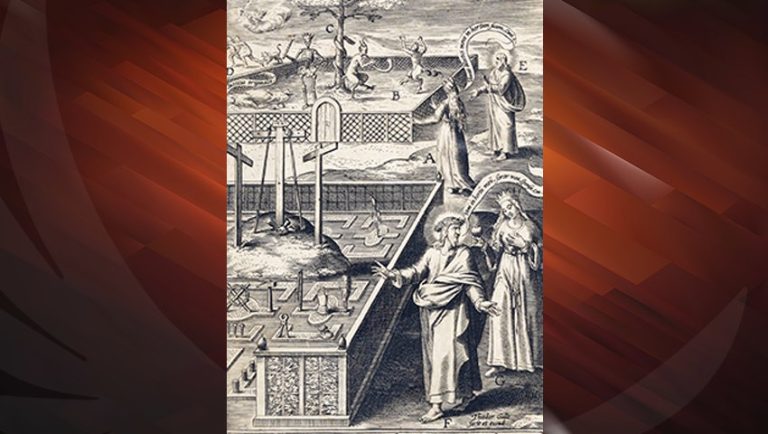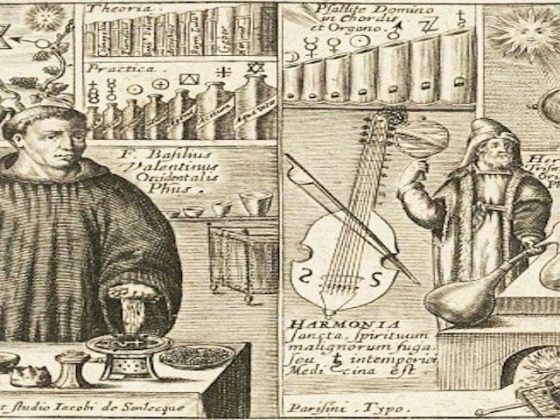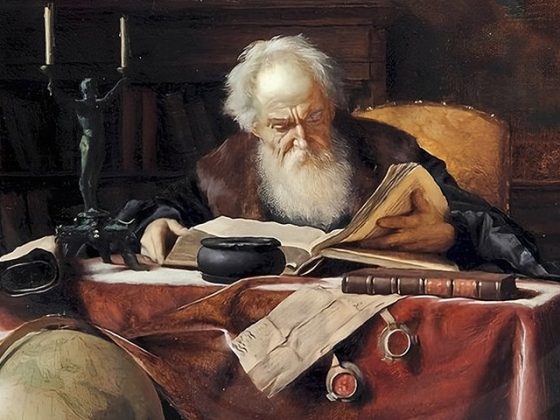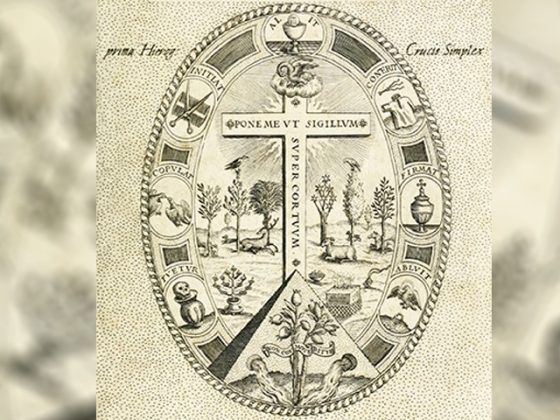Dearest friends:
I am pleased to send you this engraving entitled…
…RECIPROCA SPONSAE SPONSIQVE AD HORTUM SUUM INVITATIO
─‘A mutual invitation from the bride and groom to their garden’─
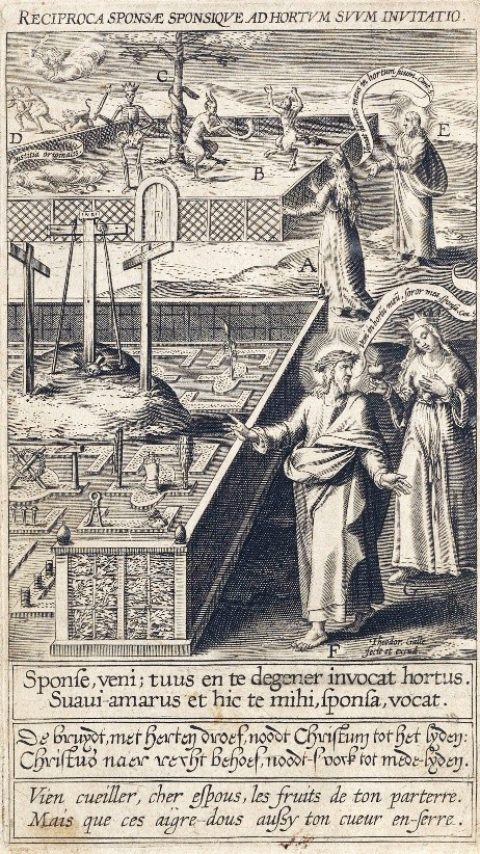
I would like to inform you, first of all, that this is one of the drawings made by the engraver Philip Galle (1537-1612) as an illustration for a book entitled Paradisus sponsi et sponsae: in quo Messis myrrhae et aromatum, ex instrumentis ac mysterijs Passionis Christi colligenda, vt ei commoriamur, ‘The paradise of the bridegroom and bride: where the harvest of myrrh and aromas has to be gathered from the instruments and mysteries of Christ's passion so that we may die for him'.
The Latin text at the bottom of the drawing and a possible translation:
Sponse, veni; tuus en te degener invocat hortus. Suaui-amarus et hic te mihi, sponsa, vocat.
‘Come, bridegroom, behold, your unworthy garden calls upon [you]. Bittersweet, and here it calls you to me, bride'.
The French text at the bottom of the drawing and its translation:
Vien, cueiller, cher espous, les fruits de ton parterre. Mais que ces aigre-dous aussy ton cueur en-serre.
‘Come, gather the fruits of your garden, dear husband. But let these bittersweet things envelop your heart, too.'
The text that accompanies the character that lies at the top left: Iustitia Originalis, ‘Original Justice'.
The wife says:
Veniat dilectus meus in hortum suum. Cant.5 [Comedat fructum pomorum suorum].
‘Let my beloved come to his garden, let him eat of the fruit of his apples.'
What the bridegroom says, below, is part of the same verse No. 1 of chapter 5 of The Song of Solomon:
The text that accompanies the Christ:
Veni in hortum meum, soror mea, sponsa. Cant. 5
‘I have come to my garden, my sister, bride.'
What is the real meaning of all these Latin phrases quoted above?
First of all, to get into this beautiful engraving we need to observe the two parts of it, one above and the other below. At the top we see a woman inviting her husband to enter the garden of love. That part shows us Luciferian satyrs dancing and blowing a horn with Luciferian music, accompanied by a serpent ─a tempting serpent─ coiled around the tree of the knowledge of good and evil ─sexuality─. Unquestionably, sexuality is directly related to the Secret Path –through Alchemy– however, as long as the Luciferic temptation is overcome by means of the sublimation of the hermetic coitus. If we do not do so, our fate will be equivalent to that of the man we see lying in the upper left part of this engraving with death at his side, as the one who always defeats the weak ─that is why the skeleton has a sword in its right hand─. That is the reason for the crown he wears on his head, for he is the one who ultimately reigns at the end of our lives.
Outside the first garden ─where we observe the satyrs─ we see a couple running, fleeing from an angel who with a flaming sword drives them away from the garden of delights, just as happened with the Adam and Eve of the Hebrew Genesis. This angel has loomed over the human race since then, according to the divine will, applying karma to the human masses.
Behind them is also a lion. This is the Lion of the Law, the Archons of Destiny who persecute all fornicators.
At the bottom of the engraving there is again a couple made up of Christ and a woman who wants to follow in his footsteps. Christ invites this woman to the garden of love, but wrapped in the perfume of myrrh. Gnostically, myrrh is associated with inner death, psychological death or death of Satan in our psychic anatomy.
The woman follows the Christ but carries in her right hand a heart to indicate to us the need to turn the coitus into a form of prayer. On the other hand, she wears a crown on her head, indicating that she is one of the souls called to live the Christic drama, since it is well known that in order to incarnate our particular, individual Lord of Perfections, it is necessary to work in the Forge of the Cyclopes or Forge of Vulcan. For this reason, Christ calls the woman “my wife, my sister”… It is a calling from her intimate Christ to the soul of said woman.
The garden of the Christ is filled with the instruments with which his crucifixion was consummated. This means that, if we want to journey through the CHRISTIC LOVE, we need to consummate in our intimacy the baptism by the divine fire, by the INRI of Gnosis. This garden is, indeed, as it is described in this engraving: SWEET AND BITTER at the same time. It is full of roses and thorns that will constantly wound our physical and animic flesh by the processes that are set in motion once we have accepted to live what is known as the DRY PATH or DIRECT PATH of the alchemists of all times.
It is written that we have the right to inhale the aroma of the apples of love, but not to swallow these apples; this is affirmed by Gnosis and we are also warned: LOVE IS LAW, BUT CONSCIOUS LOVE. And Saint Paul warned us in his time: “Every sin will be forgiven except that which attempts against the Holy Spirit” –fornication─.
To experience the CHRISTIC LOVE we will need to be betrayed ─hence the bag of coins that appears in the Christic garden─, we will need to experience the three nails of the Redeemer's cross ─which symbolize the three great purifications: by water, by fire and by iron─ we will suffer the crown of thorns ─internally speaking─ at each step of our journey, we will be victims of the insolence of the Ego ─see the whip─, we will have to acquire the Christic will ─marked by the hammer─, etc., etc., etc.
After these dissertations, allow me to give you some very timely famous quotations:
“If we were to examine ourselves from time to time, the natural result of that examination would be our perfection.”
Montaigne
“Perfection is a wonderful virtue that weighs so heavily that man cannot handle it.”
Ortega Munilla
“He who with insight recognizes the limitation of his faculties is very close to reaching perfection.”
Goethe
“Men cannot be more perfect than the Sun. The Sun burns with the same light that it warms. The Sun has spots. The ungrateful speak only of the spots. The grateful speak of the light.”
José Martí
“Perfection taken to excess dies of plethora”.
Shakespeare
FIAT JUSTITIA AUT PEREAT MUNDUS.
─'Let justice be done or may the world perish'─.
KWEN KHAN KHU


